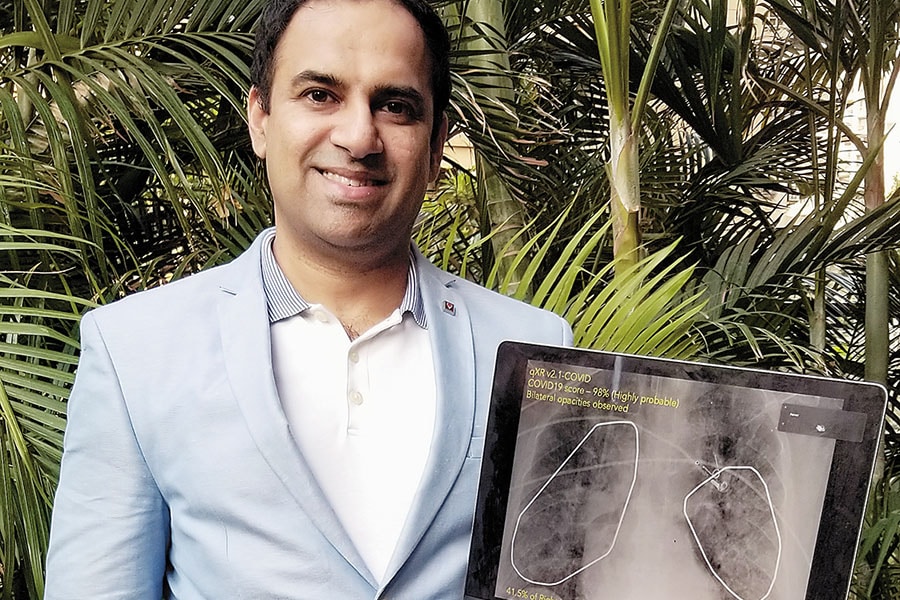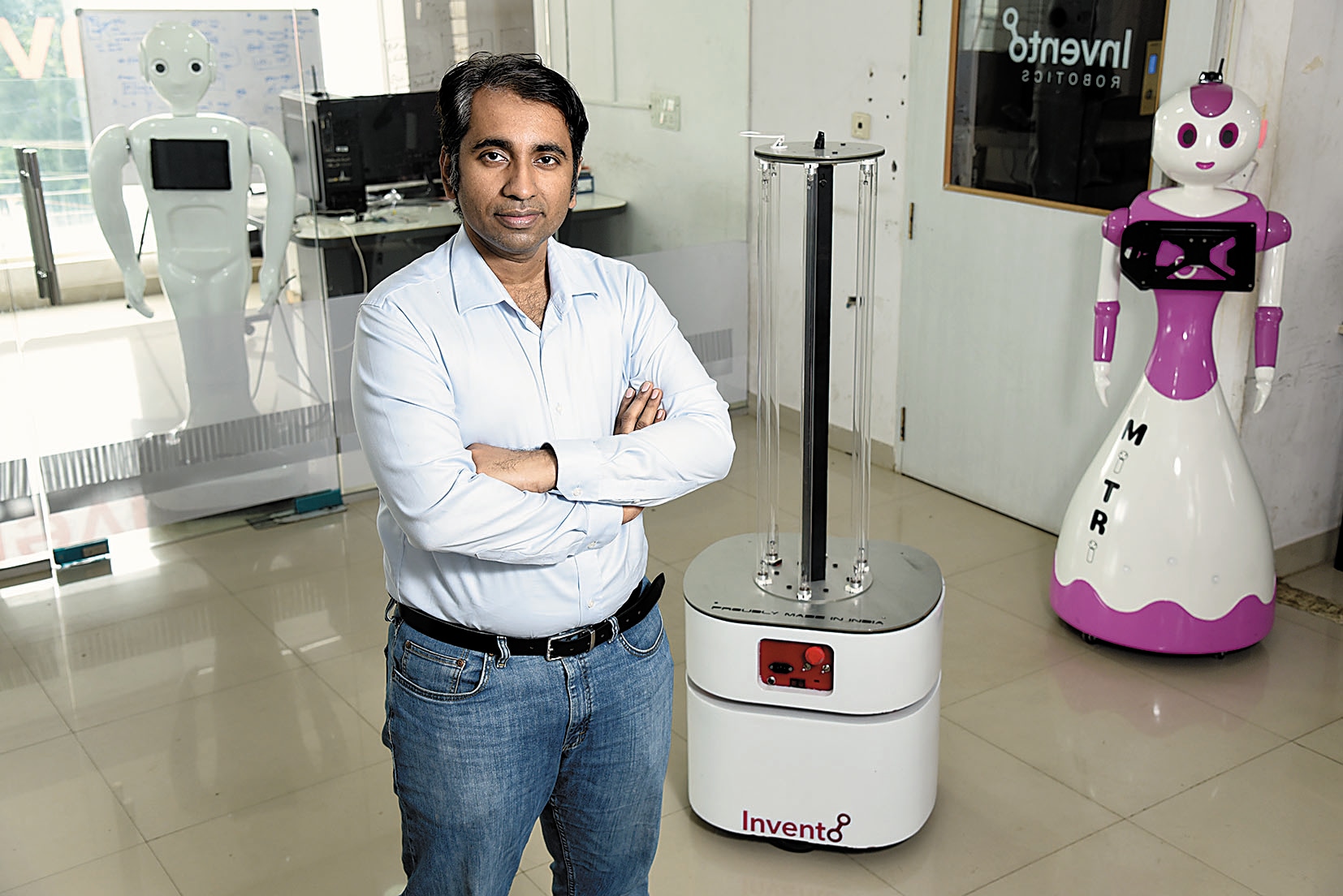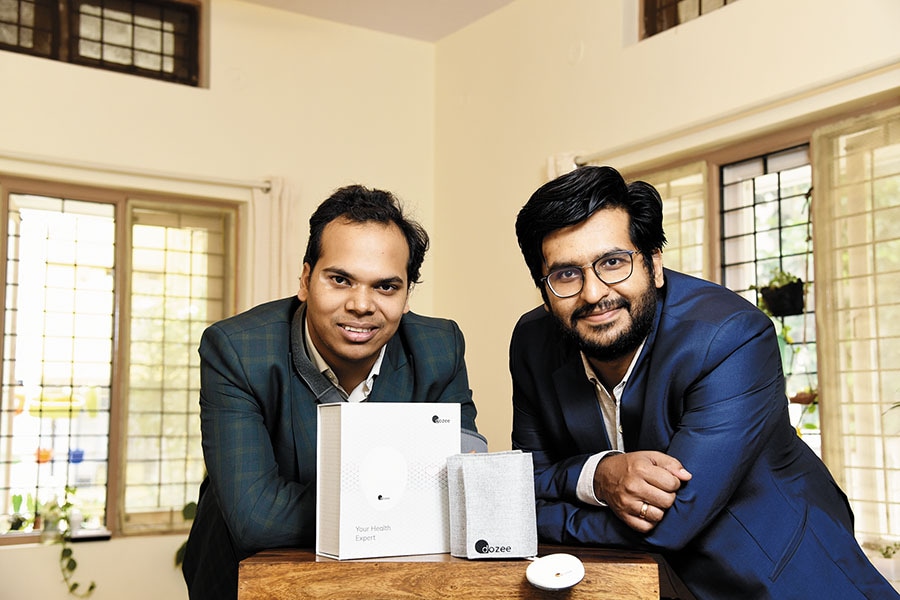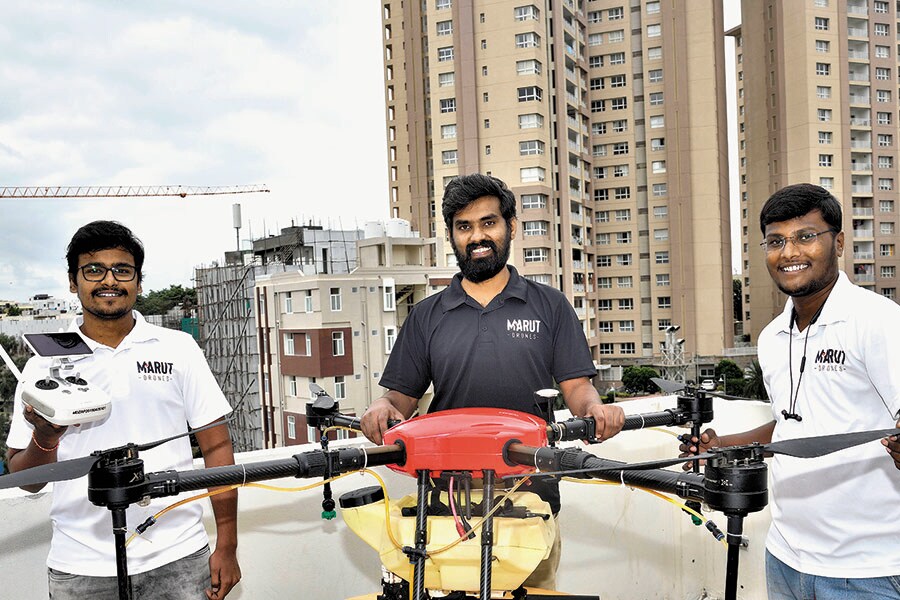5 Indian companies addressing health care needs during Covid-19
These five companies launched and modified products to address health care needs and simplify treatment during the pandemic


 Prashant Warier, CEO and founder, Qure.ai[br]Qure.ai: (X-)Ray of Hope
Prashant Warier, CEO and founder, Qure.ai[br]Qure.ai: (X-)Ray of Hope
In early March, Prashant Warier quickly realised the loopholes that existed in the global health care infrastructure. Like most health-tech startups, Qure.ai also repurposed its chest X-ray solution, qXR, to help triage for Covid-19 and monitor its progression. It uses artificial intelligence (AI) and machine learning (ML) technologies to interpret chest X-rays within seconds. Warier, who is CEO and founder, says, “We have a database of 2.5 million chest X-rays that has been used to train our ML algorithms.” The solution has been deployed in over 40 sites, across 30 countries.
Qure.ai—a grantee of India Health Fund, an organisation seeded by Tata Trusts to identify and support breakthrough innovations—is in talks with several global organisations and governments to use its technology to ramp up Covid-19 testing. So far, qXR has been deployed in 40 hospitals in South Asia, Europe and North America, and has processed 5,000 suspected Covid-19 cases per week.
Taking the solution a step further, Warier and his team introduced products catering specifically to health care workers. “For instance,” says Warier, “we launched qTrack, a disease management platform that allows health care workers to go door-to-door with just a smartphone to identify cases. It helps in location tagging for door-to-door screenings and hotspot mapping. It has the capability to take a picture of an analogue chest X-ray film and get qXR results on it.”
Additionally, the company also launched qScout—an AI-powered virtual care platform that helps with contact monitoring, triaging, daily remote follow-ups and incidence geo-mapping—while being compliant with social distancing regulations.
Post-pandemic, Warier is confident the company will continue to thrive given that qXR can find 29 detections on the chest X-ray, including multiple ones with the lungs, pleura, heart, bones and the diaphragm. “Apart from detection, since our technology can quantify progression of diseases accurately, we see it being used to decide treatment pathways in the future,” he adds.
Recently, Qure.ai tied up with AstraZeneca to use qXR to improve early-stage detection of lung cancer to reduce mortality rates and improve patient outcomes in AstraZeneca’s emerging markets, including Latin America, Asia, the Middle East and Africa. Although X-rays can be performed in primary health care centres, it is their interpretation that requires significant skill and experience. Lack of expertise in this can lead to missed or delayed diagnosis. Warier says, “qXR can aid clinicians in picking up minuscule nodules which may be missed even by experts. Such aids in early detection can have considerable long-term benefits for medical professionals in their efforts to tackle lung cancer.” Balaji Vishwanathan, CEO of Invento, with Mitra, a robot that helps health workers check patients remotely
Balaji Vishwanathan, CEO of Invento, with Mitra, a robot that helps health workers check patients remotely
Image: Hemant Mishra[br]Invento Robotics: Bots As Docs
When Balaji Vishwanathan started getting inquiries about robots fighting the pandemic, he knew it was time to go back to the drawing board. By late-January 2020, his team started working on a prototype. Mitra, Invento’s flagship robot that was earlier used in hotels and banks, explains Vishwanathan, “was modified to collect patient details, check temperatures and set up video calls with doctors, thus minimising contact with health care workers”. The pilot took place in early April at Fortis Hospital in Bengaluru.
Invento launched two more robots: C-Astra and Robodoc. “C-Astra’s primary function is to disinfect rooms. Robodoc allows doctors to virtually interact with patients inside Covid-19 wards,” says Vishwanathan. Invento has engaged with more than 10,000 patients in four countries—the US, India, Australia and the UAE—so far, via over 40 permanent deployments, globally. The plan is to deploy the next thousand by the end of 2021.
The company started another revenue stream: Robot-as-a-Service. “This is hiring a robot as an employee. The robots are owned by Invento, but the hospital is charged ₹50,000 per month for operating each of them,” says Vishwanathan.
Recently, the Bengaluru-based startup launched an advanced medical assistant robot. “It has devices like a stethoscope to take a patient’s vitals and is also equipped with deeper conversation abilities to understand a patient’s symptoms and send these data to their electronic health records for doctors to live-diagnose remotely,” explains the founder. The team claims this technology is likely to cut a doctor’s diagnosis time by up to 30 percent, saving a lot of money for hospitals.
Invento was set up 2016, and raised ₹4.6 crore last year. Clearly, the pivot to health care has worked wonders for the company. It clocked a turnover of ₹1.7 crore in FY19, and is hoping to make ₹7 crore in FY20, given the visibility it has received. “We are raising $500,000 from one of the angel groups and by the middle of next year want to close a $7 million round,” he adds.
Before the pandemic, it earned 100 percent of its revenue from India going forward, Invento’s team is primarily looking at the US market.
Vishwanathan believes this growth can sustain. “Covid-19 was a catalyst for hospitals to look at new technology. However, the fundamental problems remain—health care is too expensive and there’s a shortage of nurses and doctors, especially in rural communities,” he says. Invento’s team hopes to deploy robots to help improve accessibility to health care and reduce costs.
 Mudit Dandwate, co-founder and CEO (left), and Gaurav Parchani, co-founder and CTO, Dozee
Mudit Dandwate, co-founder and CEO (left), and Gaurav Parchani, co-founder and CTO, Dozee
Image: Hemant Mishra[br]Dozee: Health Parameters in Seconds
In July 2019, IIT graduates Mudit Dandwate and Gaurav Parchani launched a health monitoring device, Dozee, which can be kept under a mattress to capture the body’s micro vibrations. So far, the company was focusing on selling it to high-risk patients and senior citizens, but the pandemic opened new business avenues. “The device already covers most of the health parameters. But there were factors such as oxygen levels and blood pressure that were missing, so we added these,” says Dandwate, who is CEO & co-founder.
Soon, the startup started getting requests from a number of hospitals, since it was a perfect fit for monitoring patients. Every 30 seconds, the vitals for each patient would be updated, freeing up time for nurses. “The data is collected in real time, and can be monitored from a control room, minimising interactions between health care workers and patients. Changes in readings send alerts immediately to doctors or family members,” he adds. Due to the dearth of ICUs, the technology has played a key role in helping turn beds into stepped-down and makeshift ICUs.
“We are also working with 25-plus hospitals and powering over 1,900 Covid-19 beds into step-down ICUs with our technology. We have so far monitored more than 7,000 Covid-19 patients in hospitals, leading to over 30 patients getting timely transfers to ICUs,” claims Dandwate. Government hospitals in Bengaluru like Victoria Hospital and ESIC Hospital deployed 100 Dozee devices and Kingsway Hospital, Government Medical College, and Indira Gandhi Medical College and Hospital in Nagpur also deployed 300 devices to monitor patients.
Due to the rise in demand for the device, the company has crossed its last financial year’s sales in one quarter this year. The startup raised ₹12.5 crore from Prime Venture Partners, YourNest Venture Capital and 3one4 Capital in September.
Within home care, Dandwate and his team are working on expanding to remote monitoring of critical patients, especially post-ops and acute care patients. On the technology front, he says, “We are especially expanding the scope of our data science to ensure Dozee can accurately predict specific disorders, especially in the neurology, pulmonology and cardiology space.”
In the ‘new normal’, Dandwate is confident that Dozee will continue to flourish. He says, “Monitoring patients at home has become more and more relevant in current times and will remain so as patients prefer avoiding hospital visits.” (From left) Saikumar Chinthala, Prem Kumar Vislawath and Suraj Peddi, co-founders, Marut Drones
(From left) Saikumar Chinthala, Prem Kumar Vislawath and Suraj Peddi, co-founders, Marut Drones
Image: Anil Kumar P[br]Marut Dronetech: Drone-As-A-Service
We want to be the Uber of drones, via our drone-as-a-service model,” says Prem Kumar Vislawath, co-founder, Marut Dronetech. Since the company was launched in April 2019, the team has been working on four major issues—mosquito eradication, afforestation, medical delivery and agriculture. Since February, it started working on re-engineering existing drones to help fight the pandemic. “The mosquito eradication drone (Marut ZAP) was tweaked for spraying disinfectants for sanitisation, afforestation and diagnosis drones for surveillance and announcements, and agriculture drones for thermal analysis,” he adds.
For medical deliveries, they collaborated with the emerging technologies wing of the Telangana government, Apollo Hospitals and the World Economic Forum. “With our surveillance drones, we could do facial recognition for positive or quarantined coronavirus patients, and analytics on social distancing and mask usage to identify vectors amid crowds,” he adds.
The company has seen its demand going up by 300 percent post-Covid. Of the 72 drones that Marut has, close to 52 have been deployed for Covid-19 interventions.
The startup had a turnover of ₹49 lakh last year, and is looking to close 2020 with ₹3 crore. “Last year, we had only four clients, one for each drone segment. This year, we are looking to tie up with some more state governments, including Assam, West Bengal and Karnataka,” says Vislawath.
He hopes the medical delivery drones—Marut Medico—can be used for the delivery of Covid-19 vaccines or critical medical supplies even after the pandemic. Kumar, along with co-founders Suraj Peddi and Saikumar Chinthala, are betting big on the mosquito eradication sector.
Vislawath explains, “The ZAP platform—designed for disease prediction—based on our mosquito Internet of Things sensor offers real-time reports to identify high and low risk areas using predictive analytics for diseases like malaria, dengue and chikungunya.”
The company has plans to launch more products in the agriculture space—drones for crop monitoring and a drone to help with reforestation.
KPIT Technologies: Breathe Easy
Global technology company KPIT Technologies, which manufactures electronic devices for automobiles, has launched a ventilator as part of its corporate social responsibility initiative.
The Pune-based company did not have prior experience in the medical field. As a result, says Jayada Pandit, director, Thought Leadership Initiatives, “we were extra cautious throughout the process of solutioning our ventilator. The team studied the best of global benchmarks of product specifications and requirements before jumping into engineering the solution”.
After months of research on ensuring all requirements were met, KPIT’s ventilator was launched in July. “Our ventilator has a unique cylindrical shape. It is also portable and compatible for different settings, including remote medical facilities, ambulances, and home care—under Covid as well as non-Covid scenarios—to support patients,” adds Pandit. KPIT’s ventilator was selected as one of the winners in the Innovate2beat Covid Challenge by the Marico Innovation Foundation. However, like many health care companies, KPIT’s biggest challenge was the lockdown itself. Says Pandit, “The challenge was finding the material and components for the ventilator. We had to figure out a local solution eventually.”
KPIT’s ventilator is currently available in two models—a base version that costs less than ₹1 lakh and an upgraded version, which costs ₹2 lakh.
“Though the product was engineered with Covid-19 as a driving factor, it will continue to stay relevant for as long as anyone’s struggling to breathe,” she adds.
Entering the sector happened by chance, but KPIT Technologies is looking to partner with manufacturing companies in the medical fraternity to expand the distribution of ventilators.
First Published: Jan 05, 2021, 17:34
Subscribe Now